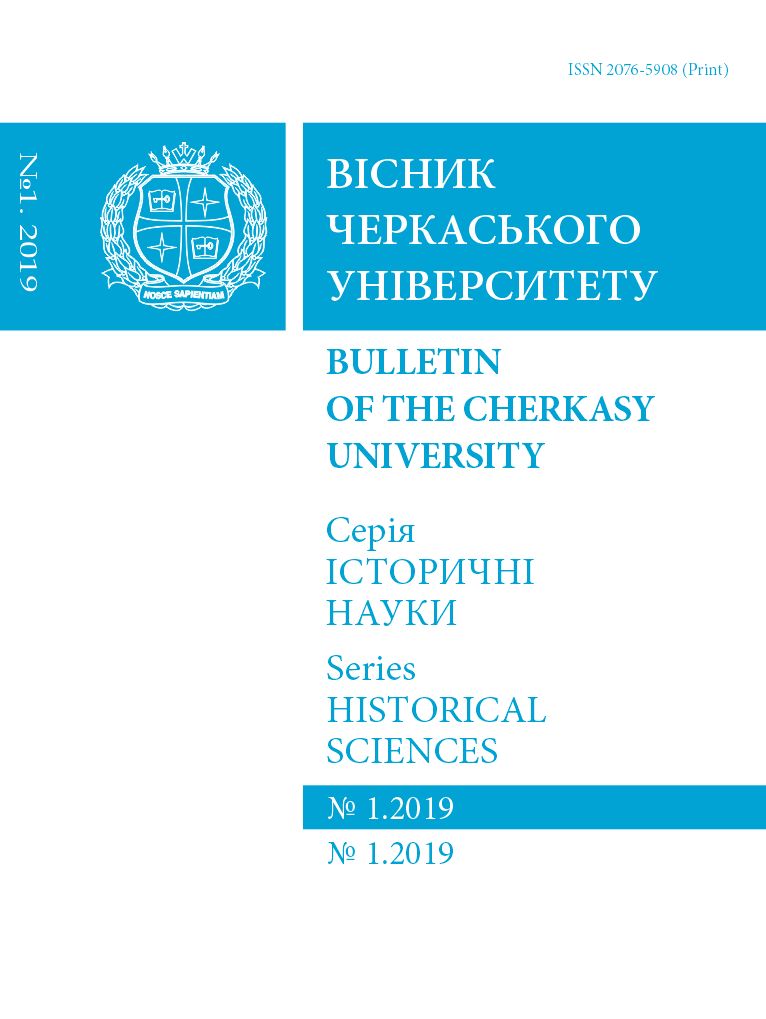Історіографічні образи Миколи Костомарова у творчій спадщині Михайла Грушевського
Main Article Content
Abstract
Abstract. The purpose of the article is the elucidation of the features of the historiographical discourse of Hrushevsky, who was the expert on M. Kostomarov’s studies. The methodological basis of the work is an interdisciplinary approach. At the same time, methods of philosophical, general-scientific and specific-historical character are applied as well. Particular emphasis is placed on the structural and functional system analysis of historiographical facts and the method of critical analysis of documentary material. The scientific novelty of the article consists of a special analysis of the historiographical studies of M. Hrushevsky, devoted to the intellectual biography of M. Kostomarov. Conclusions. Summarizing M. Hrushevsky’s reflection about M. Kostomarov, let’s first of all pay attention to its leading feature, which, in our opinion, is decisive for the spirit of the scientist’s entire historiographical legacy. This is the understanding of the priority of the interests of science, embodied in the well-known slogan of the most outstanding researcher – nemini credere, proclaimed by him at the dawn of his scientific career and consistently applied in practice. Thanks to such a critical attitude, the historiographical works of M. Hrushevsky, dedicated to his outstanding predecessor (“Kostomarov and modern Ukraine”, “Ukrainian historiography and Mykola Kostomarov. In memory of M. Kostomarov on the twenty-fifth anniversary of his death”, “From the journalistic writings of Kostomarov”, “Kostomarov and modern Ukraine”, etc.), fall back from the previous apologetic tradition in his perception and appear as attempts at intellectual biography, which inherent not so much admiration for the greatness of the researched figure, but an effort to show it in the context of the processes and events of the Ukrainian nineteenth century, to reveal and explain to the reader not only outstanding achievements but also often unfortunate miscalculations. This methodological approach of M. Hrushevsky turned out to be extremely fruitful and to a large extent explains the long-term popularity of his observations in regard to M. Kostomarov, which have not lost their influence even today.
Article Details
References
References
Doroshenko, D. (1996). Overview of Ukrainian historiography. Kyiv [in Ukrainian].
Bagaliy, D. I. (2001). Selected works: In 6 volumes, Volume 2: Source studies and historiography of the history of Ukraine. Kharkiv [in Ukrainian].
Pinchuk, Y., Hyrynevych, L. (1992). About M. S. Hrushevskyi's assessment of the scientific journalistic and polemical works of M. I. Kostomarov. Ukrainskyi istorychnyi zhurnal [Ukrainian historical magazine], 4, 112-123. [in Ukrainian].
Telvak, Viktoriia, & Telvak, Vitalii. (2005). Mykhailo Hrushevskyi as a researcher of Ukrainian historiography. Kyiv-Drohobych [in Ukrainian].
Telvak, V.V., Telvak, V.P. (2021). Modern Hrushevsky studies: gains, losses, prospects. Ukrainskyi istorychnyi zhurnal [Ukrainian historical magazine], 5, 4-16. [in Ukrainian].
Telvak, V. (2010). Hrushevsky studies: methodological problems of progress. Kraieznavstvo [Local history], 3, 29-35. [in Ukrainian].
Hrushevsky, O. (1907). A little-known article by Kostomarov from 1846. Zapysky NTSh [Notes of the SSS], LXXIX, 161-164. [in Ukrainian].
Hrushevskyi, M. (1984). Kostomarov and modern Ukraine. Ukrainskyi istoryk [Ukrainian historian], 1-4, 148-170. [in Ukrainian].
Hrushevskyi, M. (1910). Ukrainian historiography and Mykola Kostomarov. In memory of M. Kostomarov on the twenty-fifth anniversary of his death. Literaturno-naukovyi vistnyk [Literary and scientific herald], L, V, 209-225. [in Ukrainian].
Hrushevskyi, M. (1930). Ethnographic work of Kostomarov. Etnohrafichni pysannia Kostomarova [Kostomarov's ethnographic writings], Kyiv, I-XXIII. [in Ukrainian].
Hrushevskyi, M. (1928). From the journalistic writings of Kostomarov. Naukovo-publitsystychni i polemichni pysannia Kostomarova. Za redaktsiieiu akadem. Mykhaila Hrushevskoho [Scientific journalistic and polemical writings of Kostomarov. Edited by academician Mykhailo Hrushevskyi], Kyiv, III-XXI. [in Ukrainian].
Hrushevskyi, M. (1990). The development of Ukrainian studies in the 19th century and their discovery of the main issues of Ukrainian studies. Ukrainskyi istoryk [Ukrainian historian], 1-4, 28-44. [in Ukrainian].
Hrushevskyi, M. (1898). Review: Umanets F. M. Hetman Mazepa. Zapysky NTSh [Notes of the SSS], XXI, 20-23. [in Ukrainian].
Hrushevskyi, M. (1897). New intelligence on the history of ancient Rus. Zapysky NTSh [Notes of the SSS], XVIII, 1-24. [in Ukrainian].
Hrushevskyi, M. (1926). Mission Drahomanov. Ukraina [Ukraine], 2-3, 3-28. [in Ukrainian].

